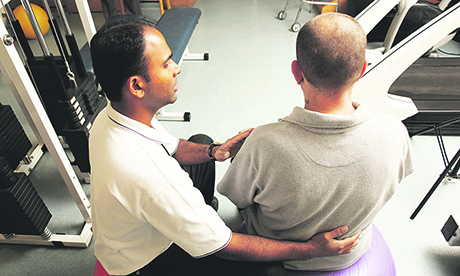New base for Mildmay hospital that combats stigma around HIV
Tucked away down a narrow road in Shoreditch sits Mildmay, a hospital specialising in the care of people with HIV.
Next month Mildmay is moving to a purpose-built hospital on a new site, giving it greater capacity to help people.
The hospital has a reputation for treating diseases with a stigma attached to them. In 1866 cholera overcame the slums of East London, and the Reverend William Pennefather of the Mildmay parish offered his help to ameliorate the suffering. When the AIDS epidemic erupted in the mid-1980s Mildmay decided to focus on the palliative care of people with HIV and AIDS.
It became the first hospice in Europe caring for those with the virus while people were dying in their thousands.
However, a breakthrough in antiretroviral drugs in the mid-1990s made HIV treatable. A diagnosis was no longer a death sentence.
CEO of Mildmay Ross White says: “Before the mid-90s everybody was here to spend their last weeks with us.
“Now only two per cent are here with an end of life pathway and over 90 per cent are here for rehabilitation.”
The rest come to Mildmay because their symptoms are complex and need controlling in the expert environment the hospital provides.
White estimates that “70 per cent of people with HIV will never be hospitalised,” adding: “If you take the antiretrovirals and other precautions, the chances of passing it on are negligible.”
Despite this, the stigma around HIV remains. Mildmay itself has been affected with barbershops in the area refusing to cut the hair of staff due to the level of fear that existed.
Some of the myths surrounding HIV and its transmission have been eradicated over time but prejudice still exists.
Kerry Reeves-Kneip, Director of Fundraising and Communications joined Mildmay, says “a neighbour said to me ‘you’d better be careful you don’t get AIDS’.
“That’s quite shocking in this day and age,” she adds.
White was told that he is more of a risk to the patients than they are to him “and on day one that was quite a good thing because it reminded me some of the preconceived ideas that people have are misplaced.”
Many patients who come to the hospital require 24 hour care, such as Margaret, who arrived in a wheelchair.
Originally from Zimbabwe, she came to England to watch her son graduate despite being very unwell. Margaret was rushed to hospital and spent the next 100 days in a coma before being taken to Mildmay.
She says: “Without Mildmay my life would be done. Mildmay told me that ‘you can do it’ and they pushed me to the limits.”
Margaret walked out of Mildmay and began a college course only a few months after first being admitted.
She now comes back to Mildmay to talk to patients. “I would not ask them how they got HIV,” she says, “I will just talk about myself and my experiences to tell them that they can do it too.”
The new hospital has the original clock from the 19th Century hospital and the hands have already started ticking, marking the beginning of an exciting future for Mildmay.

